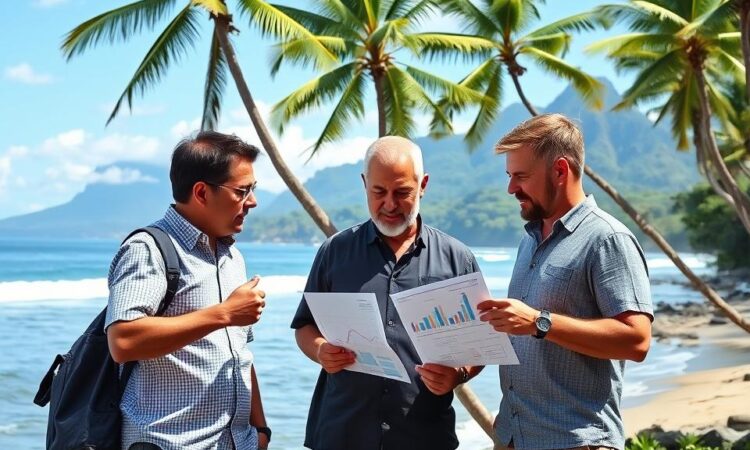
Investing in Costa Rica: Essential Tips & Guidelines With GAP Investments
Ever thought about investing in Costa Rica? It’s a tropical paradise with high yield investments. Costa Rica offers annual returns of 12% to 16%. At GAP Investments, we help you find the best investment opportunities.
Costa Rica is not just a vacation spot. It’s a prime location for profitable investments. We guide you through the market, showing you why it’s so appealing. You’ll learn about the economic stability, political advantages, and growing expat community.
Key Takeaways
- Costa Rica’s economy offers an impressive growth rate of 7.6% as of 2021.
- Investments via GAP Investments can yield annual interest rates from 12% to 18%.
- Loan amounts with GAP Investments can range from $50,000 to over $3,000,000 USD.
- Real estate investment returns average between 12% and 16% annually.
- Costa Rica’s stable political environment fosters confidence among foreign investors.
Understanding the Costa Rican Investment Landscape
Investing in Costa Rica is a unique chance. The country has grown about 3.8% each year for a decade. This growth is fueled by a booming tourism sector, drawing millions annually.
This tourism boom creates a high demand for rental properties. This makes Costa Rica a great place for those looking to invest for high returns.
Stable Economy and Growth Potential
The Costa Rican economy is strong, thanks to a good business climate and diverse industries. This stability boosts our confidence in investing here. The tourism sector has seen a 14.54% increase in visitors from 2023 to 2024.
This growth highlights the rising interest in Costa Rica. Areas like Guanacaste are seeing a surge in demand for luxury vacation rentals.
Political Stability as an Investment Advantage
Costa Rica is known for its stable politics, making it a safe haven for foreign investments. This stability allows us to explore various investment options with less risk. The legal system protects property rights for everyone, ensuring our investments are safe.
It’s important to understand local laws on property rights, taxes, and zoning. This knowledge is key to maximizing our investment potential.
Cultural Allure and Expat Community
The culture and welcoming communities in Costa Rica are big draws for investors. About 10% of the population is expatriates, creating a supportive environment for financial opportunities. Engaging with the local culture is crucial for success.
The expat community drives demand for real estate, tourism, and services. This solidifies Costa Rica’s status as a top investment destination.
The Allure of Real Estate Investments in Costa Rica
Investing in Costa Rica real estate is a unique chance. The country’s 97% literacy rate makes it attractive for property investment. With tourism growing, real estate is a top investment opportunity in Costa Rica.
High Demand for Rental Properties
Tourists and expatriates love Costa Rica, driving up rental demand. Coastal areas offer rental yields of 12% to 16% a year. This makes them perfect for high returns.
Even in off-peak seasons, rental demand stays strong. This shows Costa Rica’s real estate can be a great income source.
Key Areas for Investment: Tamarindo, Guanacaste, and More
Choosing the right spot is key for a profitable investment in Costa Rica. Tamarindo and Guanacaste are top picks because of their stunning beaches and lively communities. They offer great chances for property value to grow.
Other areas to consider include:
- Costa Ballena: Famous for its stunning coastline and eco-tourism.
- Osa Peninsula: Known for its rich biodiversity and natural beauty.
- San José: The capital offers a blend of city life and cultural experiences.
The property buying process in Costa Rica is similar to the USA, Canada, and Europe. This makes investing straightforward and rewarding. Knowing the local market well can help maximize your returns and ensure a successful investment.
What do I need to know about investing in Costa Rica
Investing in Costa Rica means knowing the local laws and market well. Understanding costa rica investment regulations is key to protecting our investments. Both locals and foreigners have the same rights when buying property, making it a great place for diverse investments. Being informed helps us make smart choices that fit our goals.
Navigating Local Laws and Regulations
Knowing the local laws is crucial for success. Here are important points about costa rica investment regulations:
- Real estate purchases usually involve a 10% deposit.
- Closing costs are estimated at 3.6% of the total sales price.
- The property transfer tax stands at 1.5% of the purchase price, which is the first tax to be paid.
- Annual property taxes amount to approximately 0.25% of the property’s value.
- A luxury tax applies to homes valued over $214,000, capped at around 0.55%.
- Non-citizens can own up to 49% of land in the Maritime Zone.
- Ownership rights are protected across Costa Rica’s diverse regions, with only 5% of beaches having titled land up to the 50-meter line.
Understanding the Real Estate Market
It’s important to understand the costa rica real estate market for good investments. Doing research helps us see market changes and property values. Working with real estate experts, like HRG Hardy Real Estate Group, offers great advice during the buying process. Investments need a solid plan, knowing foreign investments get tax breaks for up to 10 years. This opens many chances, like in eco-tourism and sustainable projects.
GAP Investments: Your Partner for Success
Looking into financial planning in Costa Rica? Having a trusted partner is key. GAP Investments is here to help. We make it easier to get the capital you need. Our finance options in Costa Rica are designed for all kinds of investors.
Competitive Loan Structures and Interest Rates
GAP Investments offers loans from $50,000, with rates from 12% to 16%. Our competitive rates help support many investment plans. This includes real estate and eco-tourism. We’ve funded over $641.7 million, showing our strength in private lending.
Quick Approval Process and Flexible Terms
Our approval process is fast, taking just 7 to 10 business days. This speed lets investors grab opportunities in Costa Rica’s growing market. Our loan terms are flexible, from six months to three years. This way, we can match financing with your goals.
Private equity loans through GAP can earn 12% to 18% annually. They’re a great choice compared to traditional loans.
Exploring Different Investment Options
Investing in Costa Rica offers many exciting opportunities. These options cater to different tastes and financial goals. We found two main paths: residential and commercial real estate. Also, eco-tourism in Costa Rica is growing, offering sustainable ventures that match global values.
Residential vs. Commercial Real Estate Investments
For those looking into Costa Rica investment properties, residential real estate is a good choice. It offers stable rental income, thanks to the strong tourism market. Properties in popular spots can bring in good returns, from $454,350 to $782,570. Investors like the lower entry costs and steady housing demand.
Commercial properties, on the other hand, can offer quick returns. They appeal to those willing to tackle a slightly more complex market. The best places to invest in Costa Rica are urban areas where businesses flourish. These areas have higher rental rates and longer leases, boosting cash flow and asset value.
Eco-Tourism and Sustainable Ventures
Costa Rica’s focus on sustainability boosts its investment scene. The eco-tourism industry, growing fast, attracts travelers who care about the environment. This creates many chances for investors. By choosing eco-friendly projects, businesses can meet growing demand for green practices.
Investing in eco-tourism lets us help Costa Rica’s environment while making money. This sector fits well with our investment goals and supports the country’s sustainable growth. It’s a great choice for those wanting to make a difference.
Financial Planning for Investors
Effective financial planning is key for those interested in high roi investments in Costa Rica. Knowing how to calculate returns and use financial products helps us improve our investment plans. The Costa Rica investment guide stresses the need for smart decisions in this lively market.
Calculating Returns: Understanding ROI
To measure our financial gains in Costa Rica, we need to grasp ROI calculation. Important factors include:
- Initial investment amount
- Net profit from the investment
- Investment duration
Real estate investments can yield 12% to 16% annually. This knowledge helps us predict our financial outcomes. Knowing the investment minimum for property and shares is $150,000 is a good starting point. We must register property purchases in our name at the Public Registry, meeting requirements like municipal valuations and tax payments.
Using Equity Loans for Maximum Leverage
Equity loans can boost our investment power. They let us use our assets to buy more. For real estate, loans range from $50,000 to over $3,000,000, with a 10% to 50% loan-to-value ratio. This flexibility helps us invest in promising projects with manageable repayment terms.
Working with GAP Investments opens the door to tailored financial products that match our goals. We can aim for higher returns while reducing risk. So, it’s vital to understand our financial situation and use effective tools for success.
Strategies for Safe Investing in Costa Rica
Investing in Costa Rica requires careful planning to ensure our money is safe and grows. Knowing the risks and rewards helps us make smart choices. This way, we can avoid big problems.
Diversifying Your Investment Portfolio
Spreading our investments across different areas is key to getting the most out of Costa Rica. This approach helps us avoid losing money when one area goes down. Investing in homes, eco-tourism, or land helps keep our finances stable.
- Invest in homes for rent or to live in.
- Look into eco-tourism, a growing field of vacation rentals.
- Consider commercial real estate for tech sector growth.
Assessing Market Risks and Opportunities
To make good investments in Costa Rica, we must always check the market. Important things to look at include:
- Make sure property titles are clear to avoid legal trouble.
- Get detailed surveys to know property lines.
- Know the rules on property use.
- Check if water and electricity are available, even in remote areas.
- Get a local lawyer for help with buying.

With tourism in Costa Rica at an all-time high, now is a great time to invest in vacation rentals. By watching the market and making smart choices, we can do well in this booming field.
Conclusion
Investing in Costa Rica is a great chance to grow your wealth. This country has a stable economy and political peace. It also offers many investment options, like real estate and eco-tourism.
By becoming a private lender with GAP Investments, we can dive into this booming market. With a starting investment of $50,000, we could earn 12% to 18% returns. Working with GAP Investments means we team up with experts in Costa Rican wealth management.
Call Now To Become a Private Lender with GAP Investments
If you’re interested, contact us to learn more about private lending. It’s a chance to make good money. Costa Rica is ready for investors like us to make the most of its opportunities.
Article by Glenn Tellier (Founder of CRIE and Grupo Gap)
